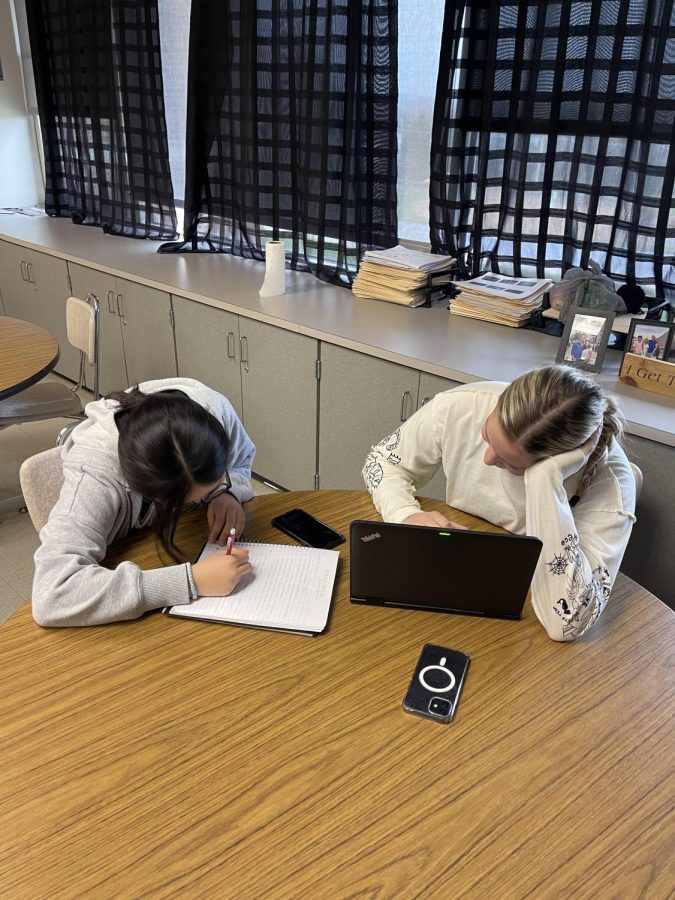Preparing for an AP Exam
Ap students Kaitlyn Chun and Carly Garis working diligently in Ap Psychology
As the school year comes to an end, there’s just one more challenge that students must face: tests. More specifically, students are preparing for AP tests. Taking a college-level course as a high schooler is already a massive challenge, but trying to recap a year’s worth of learning in one big test to earn a college credit just builds on the pressure students already have when it comes to test-taking. This leads to unhealthy practices, and instead of preparing themselves for the exam, high schoolers end up shooting themselves in the foot.
Usually, high schoolers end up staying up every night in the days leading up to the test, trying to cram in as much studying and work as possible before the big day. Despite their effort, this is actually one of the worst ways to prepare for the AP exam. According to the Sleep Foundation, a healthy number of hours for teenagers to sleep each night is 8 to 10 hours, but on the nights leading up to large exams, students end up only getting around six hours of sleep per night. This can lead to sleep deprivation and raise stress levels, both of which can affect the brain’s ability to function and think properly. Stephanie Nash, the AP Psychology teacher at Pennridge High School, suggests that students “Don’t wait until the end and cram everything in, spacing practice is best,” and further went on to encourage students to take advantage of unit notes and review after each unit ends throughout the year.
Another factor to take into consideration on the day of the exam is keeping the body healthy. Eating certain foods or not eating altogether can have a serious impact on drowsiness and functionality during the test. A study done by the London School of Economics and Political Science found that proteins and grains were the best foods to eat on the day of exams because they provide the best nutrients to make the body feel energized and full. Sara Cipressi, a junior at Pennridge preparing for her first AP exam, admitted that she “probably should eat breakfast, but I don’t think I will,” before the exam. This is a common occurrence for students, as they try to sleep for an extra half hour or so instead of eating. Despite the intention of being fresher for the test, not eating breakfast will lead to a lack of necessary vitamins to get the body functioning at its fullest potential.
It is extremely common for students to focus completely on academic preparation when preparing for an AP exam, and this can lead to overlooking mental health. Test preparation can be incredibly stressful, and ignoring the stress and not finding ways to limit it can have severely negative effects on the outcome of the test, and the student themself. An easy way to feel better mentally when stressed over tests is to listen to music. In a study done by the National Alliance of Mental Illness, it was proven that listening to music can help reduce anxiety and depression levels and provide an overall more optimistic mindset in life. When asked about fears for his upcoming AP test in May, Pennridge senior Gryphin Dean admitted his biggest fear was stress stating “it’s a lot of application of big ideas from over the year and making sure I remember them can be stressful,” which is a common fear for AP students. Finding healthy ways to limit this stress such as listening to music in the days leading up to the test can put the mind in a positive mindset when test day rolls around.
Everyone prepares for AP exams differently, and while some methods of studying or preparing will work for some people, they may not work for everyone. Trying different study methods or stress-relieving techniques helps students to learn how their brain functions and figure out how to prepare for other tests down the road.
Riley Denton, Grade 12. Interests include football, basketball, baseball, playing soccer, running track/cross country, hanging out with friends, and making...
Catelyn Thrush, Grade 12. Interests/ hobbies include softball, NHS, skiing/snowboarding, and hanging out with friends and family. Catelyn Thrush plans...





